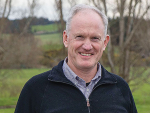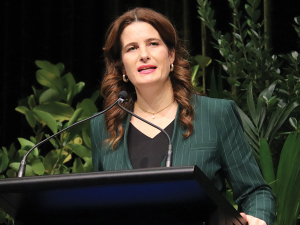He says 85% of NZ strong wool is exported as scoured or greasy, but says many people overseas are surprised that we don't make greater use of our wool at home.
He says the use of wool in government buildings will create safer and healthier environments for their occupants.
"Wool is also conducive to productivity because you have odour and sound absorption protection and natural flame retardancy.
"Another factor is that wool, unlike synthetics, is compostible and therefore not harmful to the environment," he says.
Caughey says wool is not just about flooring and there's now a whole range of high-quality products ranging from acoustic panels, air filtration systems, use in upholstery and even bedding.
He says there is a whole range of new innovative companies emerging in the non-woven space that are producing such products.
"We're ecstatic about this government policy and it's a massive relief to the wool industry." That's how the general manager of the Campaign for Wool, Kara Biggs, describes the news.
She says it could really shift the dial for the entire NZ wool industry and adds that's what her organisation was hoping would happen.
"For many years now, our strong wool growers have been pleading for government to choose quality woollen products when building and renovating state buildings. They know as well as we do that the benefits of wool are far-reaching and long-lasting - it's natural, durable, moisture-wicking, flame-resistant, hypo-allergenic and temperature regulating," she says.
Biggs says that mandating wool for use in government buildings, where appropriate, also gives our strong wool growers confidence that their industry is supported at the highest level.
"Our farmers are reassured and relieved to see that wool is no longer a struggling by-product but positioned to take its place as a pillar of our economy," she says.
Praise also came from the chief executive of Wools of NZ, John McWhirter, who says the Government has made an excellent decision that will give confidence to farmers who produce wool.
"Importantly, this decision also sends a signal to other governments and global markets that wool is a progressive choice for sustainable building and interior design and that New Zealand is ready to meet the growing demand for high-quality wool flooring," he says.
B+LNZ also supports it, with chair Kate Acland saying it will help reinvigorate the wool industry.
"It's also a reminder to global markets that NZ farmers are at the forefront of producing sustainable, high-quality wool."
Federated Farmers Meat and Wool chair Toby Williams describes the Government edict as "shear brilliance".
He says for too long synthetic alternatives have dominated the list of preferred construction materials, despite wool being a better option in so many ways.
"In the past, it's felt like a total slap in the face to see our own government choosing those synthetic alternatives over sustainable and locally grown woollen products," he says.
Williams says the announcement goes a long way in putting those past wrongs right and is certainly a positive step in the right direction.











